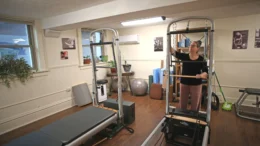HARRISBURG (AP) – The Pennsylvania Senate signaled Monday that it will give swift election-year consideration to new restrictions on elective abortions, amid a veto threat from Democratic Gov. Tom Wolf and opposition by the state’s largest doctors’ group.
The Judiciary Committee’s party-line 9-5 vote Monday, after a testy debate, set up a potential floor vote in the Republican-controlled Senate to send the bill to Wolf’s desk.
The GOP-controlled House passed the bill last month, 132-65, in a tally that approached the number necessary to override a governor’s veto.
Hearings were not held on the bill, which is getting fast consideration at a time when lawmakers are juggling highly charged social issues. Those include banning discrimination based on sexual orientation or gender identity and dealing with child sexual abuse scandals in the Roman Catholic Church.
The bill would ban elective abortions after 20 weeks, compared to 24 weeks in current law. Fourteen states ban abortion at 20 weeks after fertilization, according to the nonprofit Guttmacher Institute, a research group that supports abortion rights.
Supporters said the 20-week limit reflected medical advances that make fetuses viable at earlier stages of pregnancy.
The bill also would impose new rules over a procedure it calls a “dismemberment abortion” and make it a felony to violate them. Commonly called a dilation-and-extraction procedure, it is the most common method of second-trimester abortion.
It would provide an exception, if two physicians sign off, that the procedure would save the mother’s life or prevent impairment of a major bodily function. It does not offer exceptions for pregnancies caused by rape and incest. For procedures on a fetus beyond 20 weeks, it would require two physicians to be present and for the procedure to be done in a hospital.
Abortion opponents are pushing the legislation, just two weeks after the U.S. Supreme Court struck down Texas rules that required abortion clinics to meet hospital-like standards for outpatient surgery.
Judiciary Committee Chairman Stewart Greenleaf, R-Montgomery, said after the vote that the bill does not unconstitutionally set up barriers to access to an abortion.
“We’re providing an opportunity with the advice of medical counsel as to whether this is a threat to her health or her life, and then after that decision is made, and they can follow whatever procedure they desire to follow,” Greenleaf said.
Sen. Daylin Leach, D-Montgomery, said the bill’s wording sounded like it had been written by an “interest group,” and that the intrusion into medical decisions would put the interest group “in the hospital room with the patient and the doctor.”
“Interest groups and legislators are not really good at making medical decisions, because we’re not trained to do that,” Leach said during the committee debate. “That’s what doctors are trained to do, and that’s why I think we should leave this in the hands of doctors.”
The Pennsylvania Medical Society opposes the bill. The doctors’ group says it interferes with the relationship between physicians and patients, and sets a dangerous precedent by legislating specific treatment protocols.
Wolf calls it a step back for the state and for women.
Six states have approved laws to ban the dilation-and-extraction procedure, according to the Guttmacher Institute.
West Virginia’s prohibition is in force, court challenges have stopped implementation in three states and newly passed bans in two states have not yet taken effect.































